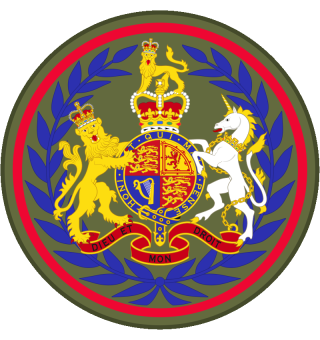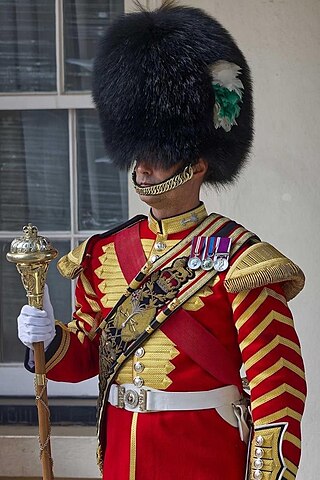This article needs additional citations for verification .(September 2014) |
Staff sergeant major [1] is an appointment in some Commonwealth armies and also a rank in the Royal Canadian Mounted Police.
This article needs additional citations for verification .(September 2014) |
Staff sergeant major [1] is an appointment in some Commonwealth armies and also a rank in the Royal Canadian Mounted Police.
Staff sergeant major is a Royal Canadian Mounted Police (RCMP) rank above staff sergeant but junior to sergeant major.
Staff Sergeant Major is an Israel Police and Israel Border Police (Magav) rank junior to Advanced Staff Sergeant Major.
Staff sergeant major (SSM) is an appointment in the British Army held by warrant officers class 1 in the Royal Logistic Corps who are not conductors or regimental sergeant majors.
Staff sergeant majors existed in the Army Service Corps and Ordnance Store Branch in the 19th century. In 1896, however, staff sergeant majors in the new Army Ordnance Corps were renamed sub-conductors (becoming staff sergeant majors again in 1967). Staff sergeant majors remained in the Army Service Corps, later the Royal Army Service Corps, and continued when it became the Royal Corps of Transport in 1965. The appointment passed to the new Royal Logistic Corps in 1993.
In 1892, conductors of supplies in the Army Service Corps were renamed staff sergeant majors 1st class. Like the conductors, they wore their royal arms rank badge in a wreath. The appointment has now been abolished.
Warrant officer (WO) is a rank or category of ranks in the armed forces of many countries. Depending on the country, service, or historical context, warrant officers are sometimes classified as the most junior of the commissioned officer ranks, the most senior of the non-commissioned officer (NCO) ranks, or in a separate category of their own. Warrant officer ranks are especially prominent in the militaries of Commonwealth nations and the United States.
Regimental sergeant major (RSM) is an appointment that may be held by a warrant officer (WO) in the British Army, the Royal Marines, and the armies of many other Commonwealth and former Commonwealth nations. It is also an actual rank in the Irish Defence Forces, and formerly in the British Army, Royal Marines and United States Army. Only one warrant officer holds the appointment of RSM in any regiment or battalion, making them the senior warrant officer; in a unit with more than one top-ranked WO, the RSM is considered to be first amongst equals". The RSM is primarily responsible for assisting their commander in maintaining standards and discipline amongst the non-commissioned members and acts as a parental figure to their subordinates, sometimes referred to by the mantra "Drill, Dress and Discipline".

A non-commissioned officer (NCO) is a military officer who does not hold a commission. Non-commissioned officers usually earn their position of authority by promotion through the enlisted ranks. In contrast, commissioned officers usually enter directly from a military academy, officer training corps (OTC) or reserve officer training corps (ROTC), or officer candidate school (OCS) or officer training school (OTS), after receiving a post-secondary degree.
Sergeant (Sgt) is a rank in use by the armed forces of many countries. It is also a police rank in some police services. The alternative spelling, serjeant, is used in The Rifles and other units that draw their heritage from the British light infantry. Its origin is the Latin serviens, 'one who serves', through the Old French term serjant.
Corporal is a military rank in use by the armed forces of many countries. It is also a police rank in some police services. The rank is usually the lowest ranking non-commissioned officer. In some militaries, the rank of corporal nominally corresponds to commanding a section or squad of soldiers.
Staff sergeant is a rank of non-commissioned officer used in the armed forces of many countries. It is also a police rank in some police services.
Sergeant major is a senior non-commissioned rank or appointment in many militaries around the world.
Company quartermaster sergeant is a military rank or appointment.

Conductor (Cdr) is an appointment held by a few selected warrant officers class 1 in the Royal Logistic Corps and is one of the most senior appointments that can be held by a warrant officer in the British Army. Previously conductor was the most senior warrant officer appointment, but it was outranked with the creation of the Army Sergeant Major appointment in 2015 following Army reforms. The appointment was also reintroduced into the Royal Australian Army Ordnance Corps for selected warrant officers class 1 in 2005.

"Other ranks" is the term used to refer to all ranks below officers in the British Army and the Royal Marines. It includes warrant officers, non-commissioned officers ("NCOs") and ordinary soldiers with the rank of private or regimental equivalent. Officers may, in speaking, distinguish themselves from those "in the ranks".

The company sergeant major (CSM) is the senior non-commissioned soldier of a company in the armies of many Commonwealth countries, responsible for administration, standards and discipline. In combat, their prime responsibility is the supply of ammunition to the company. They also oversee the distribution of other supplies, such as water or food, although that responsibility is mainly that of the company quartermaster sergeant (CQMS), and evacuating the wounded and collecting prisoners of war.

Quartermaster is a military term, the meaning of which depends on the country and service. In land armies, a quartermaster is an officer who supervises logistics and requisitions, manages stores or barracks, and distributes supplies and provisions. In many navies, a quartermaster is a seaman or petty officer with responsibility for navigation and operation of the helm of a ship.

The Royal Army Ordnance Corps (RAOC) was a corps of the British Army. At its renaming as a Royal Corps in 1918 it was both a supply and repair corps. In the supply area it had responsibility for weapons, armoured vehicles and other military equipment, ammunition and clothing and certain minor functions such as laundry, mobile baths and photography. The RAOC was also responsible for a major element of the repair of Army equipment. In 1942 the latter function was transferred to the Royal Electrical and Mechanical Engineers (REME) and the vehicle storage and spares responsibilities of the Royal Army Service Corps were in turn passed over to the RAOC. The RAOC retained repair responsibilities for ammunition, clothing and certain ranges of general stores. In 1964 the McLeod Reorganisation of Army Logistics resulted in the RAOC absorbing petroleum, rations and accommodation stores functions from the Royal Army Service Corps as well as the Army Fire Service, barrack services, sponsorship of NAAFI (EFI) and the management of staff clerks from the same Corps. On 5 April 1993, the RAOC was one of the corps that amalgamated to form The Royal Logistic Corps (RLC).

A bandmaster is the leader and conductor of a band, usually a concert band, military band, brass band or a marching band.
Quartermaster sergeant (QMS) is a class of rank or appointment in some armed forces, especially those of the United Kingdom and the Commonwealth, and formerly also in the United States.

A warrant officer (WO) in the British Armed Forces is a member of the highest-ranking group of non-commissioned ranks, holding the King's Warrant, which is signed by the Secretary of State for Defence.

A drum major in the military is the individual leading a military band or a field unit. It is an appointment, not a military rank. Military drum majors utilize a ceremonial mace for giving commands while marching. Many drum majors, particularly American- or British-influenced ones, wear a sash that can carry embroidered badges of their home unit and battle honors; a pair of ceremonial drum sticks are often attached.
This is a list of Meritorious Service Medals (MSM) awarded in the 1918 New Year Honours.
This is a list of Meritorious Service Medals (MSM) awarded in the 1919 New Years Honours.